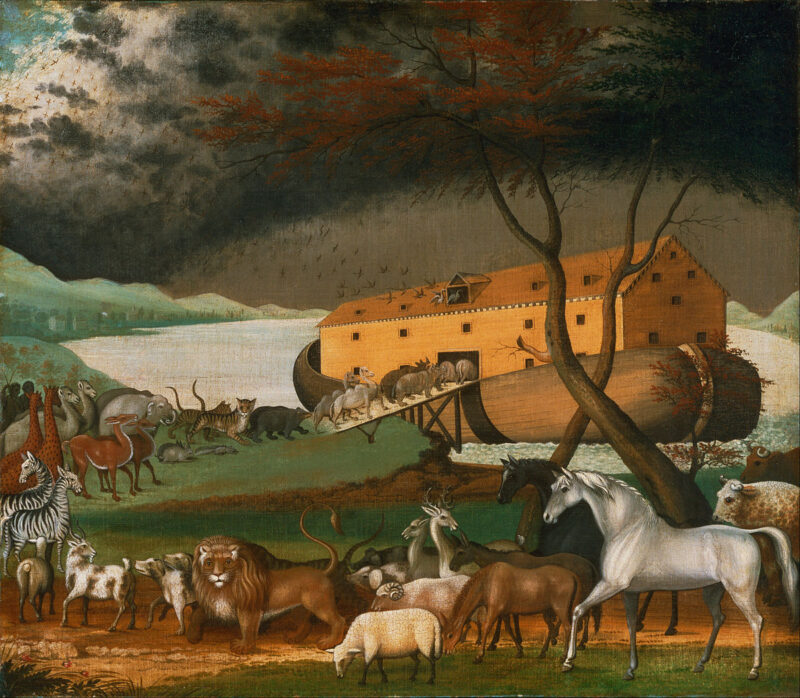
Ten generations after Adam, the Earth was corrupt, filled with violence. Evil spread more than ever. Humankind believed in idols who were busy building their fortune; religion was deviated and truth was twisted.
Wanting to stop this dark course, God chose a righteous man, Noah, to guide people to the right path. Noah called people to partake in true knowledge, and warned them against the coming evil. A few among them heeded, while others did not want to believe that Noah was the messenger of God who spoke the truth. They mocked him and even tried persecute him. God saw that the human race did not change for better, and He informed that a great flood would come and the Earth would be completely submerged. Thereupon, He ordered Noah to build an ark, and to gather in it only those who believed in him. Noah, who was 600 years old when he received God’s order, built the ark with the help of Gabriel (Genesis chapters 6-9).
Noah’s life, according to some sources, lasted 950 years.
Noah’s wife and one of his sons did not believe in him, while his other three sons did. When the construction of the ark was finished, the three sons, a handful of other believers, and a pair of every animal species boarded the ark. Immediately after, the divine deluge wiped out most of humanity. For forty days and nights, ceaseless rain poured from the sky and waters gushed from the Earth. Not a piece of land remained untouched by water on the face of the Earth. The only ones who were saved were those who were on board. As the ark continued to roam across the waters for weeks, they cooked what they had gathered before the flood: wheat, barley, beans, peas, corn and similar grains. Provisions of the dish were also spared for the animals.
One day Noah opened a small window in the ark and sent a crow, saying “Go see if there is dry land.” But the crow returned without finding any. After a while, Noah sent a dove on the same mission. The dove also returned without finding any. A few weeks later, Noah sent out the dove again. The dove returned at dusk with an olive branch in its beak. Thereupon, Noah realized that the waters have started to recede, and that the soil was able to produce crops again.
A week later, when the dove that flew out from the ship did not return, Noah saw that the ship was sitting on dry land.
God informed: “Now you can get out of the ark with your family. All animals can scatter and reproduce. There will be seasons from now on when you can sow and reap your crops.”
Noah opened the gateway of the ark, and everyone came out in rows. The sun came out in the sky, the waters receded, and the Earth finally appeared once again. Noah turned to God in heartfelt gratitude, and thanked Him for all that was bestowed upon them, and for the salvation of those on the ark.
Just then, a rainbow appeared and arched across the sky. The survivors of the deluge settled on Earth, and life began anew.
Duygu Bruce








2 comments On The Companions of the Ark
My wife and I can’t find the the issue of Noah’s wife in decision against his following God’s revelation, nor the presence of a few other people in the Ark in our reading of Genesis chapters 6-9. We are most interested in knowing you source of this information.
Karl E Falster
Thank you and your wife for your interest.
The story of Noah’s Ark is told in several Holy books. These books carry some contradictions in the details of the story including his wife’s decision to not join him. The way the story is retold here is an amalgamation of the sacred books of the monotheistic religions. “The presence of a few other people” means the wives of the sons that did join him on the Ark.